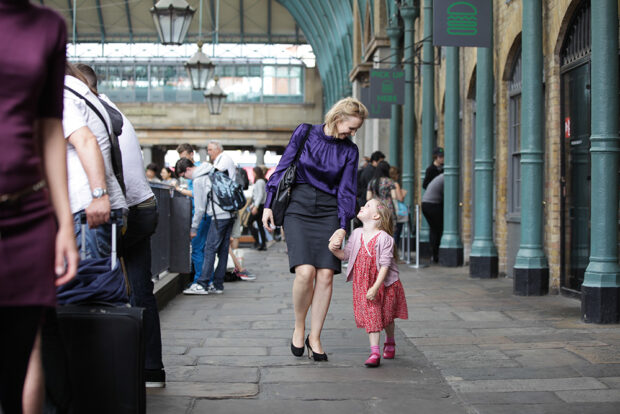A friend said to me recently, “I am so inspired by your work ethic and quality of work, even when you’re really busy.”
I paused for a moment to let in what she was saying. I realised a couple of things from this comment. One, I am not appreciating how incredibly dedicated I am to my job and, two, I really am incredibly dedicated to life in general. I credit this in large part to all that single parenting has taught me over the years.
I genuinely enjoy being a single parent, which might be hard to believe given how the normal single parent story goes.
I entered single parent-land before my daughter was born. Not your average ‘have a child and in comes the conflict that leads to a break-up’ kind of situation, as the relationship with her father ended before she was born. This put me on a high velocity learning curve for the next ten years (and I’m still learning!). It immediately brought me face-to-face with the ‘R’ word – Responsibility. There’s nothing that brings you to your humble knees more than a new-born baby requiring your absolute undivided attention … and knowing that it will be for the rest of his/her life is somewhat discombobulating when one first considers the implications of their previous free-to-do-what-they-like style of life.
In saying that, it taught me a lot about embracing the unknown. I had to learn to let go of any pictures I had around what raising a child was like. I had to surrender to all that was on offer to support me. There’s nothing like a sick child when you have a work project due and no family or partner in town to care for them. I had to get resourceful and drop any pressure or expectations I may have felt about the day going the way I had planned it.
My daughter’s father lived in London and I moved back to Australia when I was seven months pregnant. This is still the arrangement and we’ve made it work amazingly well over the years but to begin with, it was exceptionally challenging – physically, mentally, financially and emotionally. Embracing the unexpected has been one of the best tools to navigate the sole parenting challenges as it makes the tension of what arises less overwhelming. It also helped me be open and to look for options of support outside of the box.
To me true parenting involves a community of people, yet I had created a situation where I was physically and financially holding the bulk of the responsibility. It was a perfect set up for the kind of poverty energy that often hangs around single parents – the ‘doing it on my own’, ‘this is hard’, ‘poor me’ flavours of thought and behaviour. I would not say these things out loud. I was too proud to do so. They would manifest inside, fuelling the drive to be ‘the everything parent’. This would feed the self-indulgent notion that the raising of this child landed on my head and my head alone. If she turned out so-called ‘bad’ then I would be the only one to blame. So, I tried my best to do everything I could to do a ‘good’ job, as the world sees good parenting to be. It was the perfect set up for the perpetual try-fail cycle, as in truth none of us can do life alone, let alone raise another being.
Slowly over the years I disentangled myself from this way of thinking and a big part of that has been to let others support in various areas. Whether that be with friends and elders in our community spending time with my daughter, housecleaning support, dropping the intensity with ‘juggling’ work with caring duties, being honest in times where I find being the sole carer challenging – a myriad of things that help crack the false and destabilising consciousness of single parenting. It’s a humbling process to say the least.
The reality is life as a single parent has both its pros and its cons and depending on how you play it will very much depend on how you feel at the end of each day. For example, it took me a long time to accept that I was the primary carer 100% of the time (other than when my daughter’s father visited us, or we visited the UK). It was that lack of acceptance that made the day to day more of a ‘daily grind’ than a daily joy. Until a switch flicked, and I dropped my resentment towards the situation, I found the everyday tasks and care-giving difficult. When that layer of resentment dropped it was like a breath of fresh air to the home. It gave me space to actually enjoy the so-called monotonous tasks of the everyday, not to mention enjoy being with my daughter, colleagues and others much more.
One of the pros I’ve loved from the get-go is being the person who offers the primary reflection of what it means to be an adult. This is a huge responsibility and one I’ve learnt to embrace. Kids watch every move we make. They listen to the tone of our voice, take in how we treat them (and others), copy what we say and how we move – they are the ultimate observers. Over the years I noticed that my daughter’s mood, behaviour and even mannerisms often were a direct reflection on how I was being. There’s nothing like a tantruming child to show you where you’re having mini tantrums or resistances within yourself! This goes for any parent I’m sure, but it tends to be more heightened when there’s no other adult in that moment to share your feelings with. Being humble and open to another way of doing things, was my best friend when I was reacting to something. It’s only now that I realise the reaction occurs because we can’t control a certain situation.
Could it be that controlling what is happening in that moment is not what’s needed? What happens when we let go of trying to do, be and solve it for all?
As a single parent, I found the very practical day-to-day doings of life are where I used to come undone. There is so much to do when looking after a child – particularly the under 5’s. With new-borns, it’s a game of constantly feeding and changing nappies 24/7. When they start crawling, we need to constantly watch that they don’t get into anything that will hurt them. When they start walking, it’s about not letting them run too far in the park. At every age it’s about ensuring there is a connection between you. Parenting is a constant – no off switch.
I used to think that having no switch-off time was a con. I’ve learnt over the years it is a pro. It certainly has helped me grow as a person as I had no choice but to look after myself better. If I checked out on food or drink that didn’t support me, or didn’t get enough exercise or stayed up later to have ‘me time’, when really I needed an early night to bed in order to recharge – I’d feel it. I couldn’t get away with not caring for myself. If I tried to, it would affect my relationship with my daughter. Even as a baby she could feel it when I was not being my true or full self because her behaviour would reflect how much I’d checked out of myself (and consequently her). There was no getting away with it. The only way I could feel great through the day was to deeply care for myself. It’s simple, yet how often do we put our wellbeing at the top of the priority list? It is actually easier to care for ourselves than to not as our mind stays clearer and our body feels better, therefore we naturally have more energy and time to use in the day. I can’t tell you how much space opened up for me when I stopped eating junk food and watching movies in the evening!
Another huge factor in being able to manage a busy work role has been to support my daughter to be self-aware, responsible and independent from the get-go. At every age, I’ve held her in a way that encouraged her to learn and think on her own two feet. Kids naturally want to get involved and be part of it. Yet many parents over do things for their kids because it’s so-called easier. Especially busy parents. In the long run it’s not. From my experience, they become overly reliant on the parent/s, and to put it plainly are disempowered by not being given the space to learn and explore for themselves.
What I have observed and experienced since becoming a single parent is that we tend to over-teach our children – but generally speaking, the ‘teaching’ is loaded with our expectations and controlling ways. If we don’t hold our children as equal to us in terms of them being capable of learning quickly and using their own innate wisdom, then we may be capping their potential. It never ceases to amaze me what I learn from children, and if we come from that place, it’s easier to include them as equal contributors to the household. A child, as with any adult who has a sense of purpose in their life, relishes the feeling of contributing to the world – especially when we as adults make it look simple and fun.
One of the most debilitating things I have experienced as a single parent is to try to do it all myself because ‘I should be able to’. It’s quite a self-indulgent notion when you think about it – that one person can be the sole carer for raising a child. What limits are we putting on ourselves and our children when we do this?
The old adage of ‘it takes a village to raise a child’ is true. I have found the most loving way (for both myself and my daughter) is to welcome support from others to give her a full experience of life outside the comfort of our home. If I wrap her up in cotton wool and huddle into a small family unit, what am I offering her? This only offers her one perspective –my perspective – of how life can be. But also, am I not putting an incredible amount of pressure on myself to be the one and only resource for her?
The energy of ‘single parenting’ could be turned around in an instant if we approached it as ‘soul parenting’, encompassing not only our connection to Soul but also the many other souls in our child’s life – from grandparents and other elders in our community, to aunties and uncles (both blood and adopted), to other parents and carers, child minders, teachers and the list goes on. Imagine if every adult parent – single or not – embraced soul parenting.
In my experience soulful parenting is simply about being present with and responding to the requirements of each moment from a place of love and innate wisdom. For me this started with having a more intimate relationship with what I was feeling in my body. This made it easier to drop the behaviours and foods that weren’t supporting a loving expression. For example, if I had a coffee and felt racy, it was harder to connect to my daughter in a genuinely joyful way because I was buzzing on caffeine – smiling and energised yes, but not settled in my body or with the warmth I had the capacity to hold her in. Parenting from the Soul asks me to look at every detail that may be holding me back from deeply connecting with my own sensitivity and that of another. It asks me to drop any distractions that may inhibit my natural essence to flow forth and share with my child.
When we focus only on the functional, practical jobs of life, we miss out on something worth celebrating … Ourselves. We are not simply single parents, mums or dads, accountants or marketers (or whatever job we do). These are roles that we carry out. How we do these roles makes a huge difference to our level of enjoyment in life. When there is so much to do on a practical level as a single parent, it’s a gift to be able to make light of all these jobs by enjoying ourselves and appreciating ourselves whilst doing them.
A wise and very playful woman once shared with me how she would walk around her house high-fiving herself. It feels a bit odd at first if we’re not used to loving ourselves up, but eventually we get to feel just how amazing we are and with that enters a huge amount of joy.
By Nicki Ferguson, Bachelor of Commerce, Dip Community Services, Cert IV Graphic Design, NSW, Australia
Further reading:
Parenting and Self-Care – Crashing the ‘Helicopter Parenting’ myth
Parenting Our Children
Being a woman is more than being a mother





